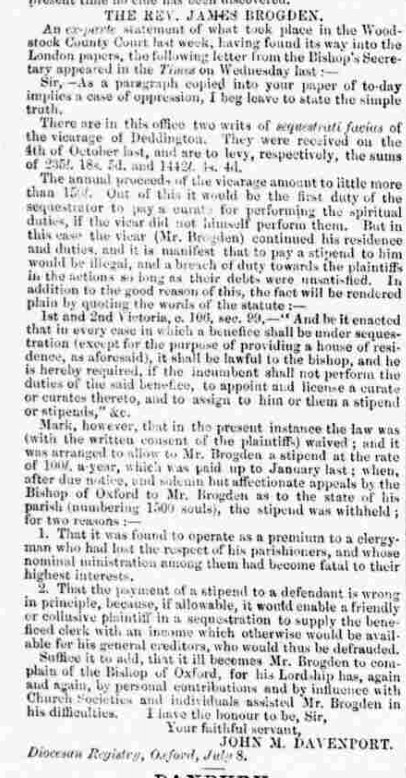Millennium Project
Rob Forsyth
We knew little about the Reverend James Brogden's early life until John Plumbe drew our attention to the Brogden family website (c.f. An Unpopular Vicar). Its current editor, Iain Brogden, has very kindly consented to our using the
research carried out by his father, Michael, about Brogden's early years prior to his arrival in Deddington.
He succeeded Rev. Cotton Risley as Vicar in 1848 and continued in office until his death in 1864. After a promising start, his tenure became an increasingly troubled one due to his drinking, absenteeism, debts and irascible character. A widely supported appeal by 128 parishoners to the Bishop for his removal did not succeed, despite urging by Bishop Wilberforce "Your continuance at Deddington is, and my judgement now, ever must be fatal to the interests of Christ's church and the souls of your people." In response Brogden referred to "the tedium of being crossed by the small minds of Deddington" and that "nothing but preferment should ever induce him to resign."
The Early Years 1806-1848
The following extracts are courtesy of the Brogden website: Brogden's baptism was recorded at St Giles, Cripplegate, London. He is thought to be the son of John Brogden, a London jeweller - possibly John Brogden of Watherston and Brogden.1 There was an older brother, John, baptised in 1803.
There was another Brogden family who lived in Witney, Oxfordshire, with whom Jame's family was not related.
Brogden and his wife, Ernastine Matilda Sophia (Perks), had seven children
- Frederica Caroline Eloise; baptised 1838, St Michael's, St Albans
- Mary Katherine; baptised 1840; St Michael's, St Albans
- James; baptised 1841, Great Henney, Essex
- William Henry; baptised 1845; buried 1865, Deddington (see more on his 1862 felony later)
- Edith Blanch; baptised 1847, St Michael's, St Albans
- Bertha; baptised 1848, Deddington
- Arthur; baptised 1850, Middlesex
He went to Trinity College, Cambridge, and published several massive volumes of theological works (for example, Illustrations of the Liturgy and Ritual of the United Church of England and Ireland (3 volumes;1842) and Safeguards against Popery (3 volumes;1846).2
Brogden shoots a policeman
John Brogden writes " an earlier extraordinary episode in the troubled life of James occured when he was a curate in Childwickbury. This
story is reported in "Hertfordshire Murders" by Nicholas Connell and
Ruth Stratton (Sutton Publishing 2003). James Brogden
shot a policeman, PC Cornelias Wintle. The policeman survived and the
Reverend gentleman was acquitted of murder." Just why he should have shot the policeman is an interesting story.
1 Jackson's Oxford Journal 5 July 1856 says that when Brogden was cross-examined in the Woodstock County Court about sources of income he stated:" I receive £1 per week... from the Goldsmith's Company." Brogden's father was a London jeweller.
2 Brogden wrote quite a number of theological works
several of which were published by J.S. Hirons of Deddington. More
about his publications can be read from page 7 onwards of Printers and Publishers in Deddington (Brian Carter 2004). I suggest use word search (ctrl+f) because, after page 8, Brogden's name is spread over another 11 pages.
An Unpopular Vicar 1848-64
For an overall view of why Brogden was so unpopular in Deddington, it is well worth reading this extract from Geoffrey Smedley-Stevenson's introduction to Vol II of Early Victorian Squarson - The Diaries of William Cotton Risley Former Vicar of Deddington 1849-69 (Banbury
Historical Society 2007). His drinking, debts, frequent absences (one of three years) and rudeness to his fellow parishioners is mentioned on no less than 102 out of the 550 pages in his book! George Coggins' scrap books and local newspapers also frequently refer to them. There are just too many to list in one article.The following may provide a flavour.
The Deddington Pool Affair.
In July 1854, as chairman by law of ratepayers' meetings, Brogden was responsible for the vote counting between three different proposals as to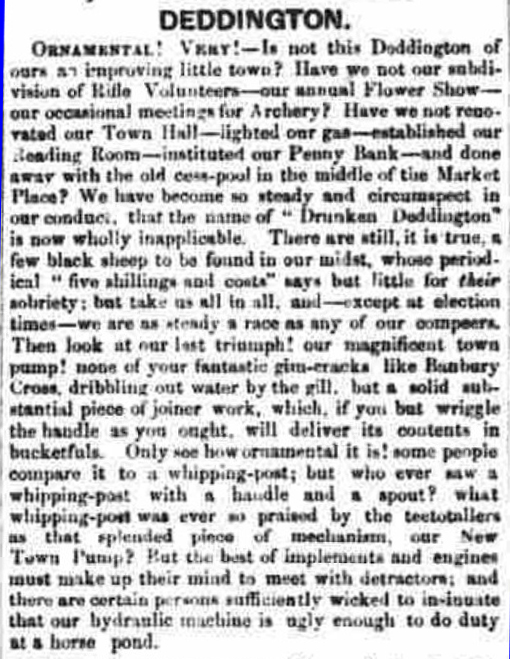 what to do with "... a stagnant pool, which for years has been a place of danger, and a public nuisance...". He managed to turn the vote counting into a public controversy, including him insulting one of the proposers, John Calcutt (Postmaster and a prominent Wesleyan), by calling him a 'Protestant Dissenter', 'Sham Officer of the Pope' and 'Grand Inquisitor of Deddington'. The full exchange is very illuminating and we can read it on the hand bills (19th Century social media) which recorded the various exchanges between the parties. A transcript of the hand bills is in our archive (Coggins' scrap book No 2).
what to do with "... a stagnant pool, which for years has been a place of danger, and a public nuisance...". He managed to turn the vote counting into a public controversy, including him insulting one of the proposers, John Calcutt (Postmaster and a prominent Wesleyan), by calling him a 'Protestant Dissenter', 'Sham Officer of the Pope' and 'Grand Inquisitor of Deddington'. The full exchange is very illuminating and we can read it on the hand bills (19th Century social media) which recorded the various exchanges between the parties. A transcript of the hand bills is in our archive (Coggins' scrap book No 2).
After three attempts to reach agreement, a final, uncontested, decision was made to fill the pool and erect a pump above a well. A very tongue-in-cheek article in The Banbury Advertiser on 20 February 1862 (click on image above left) describes it.See also a summary of newspaper references.
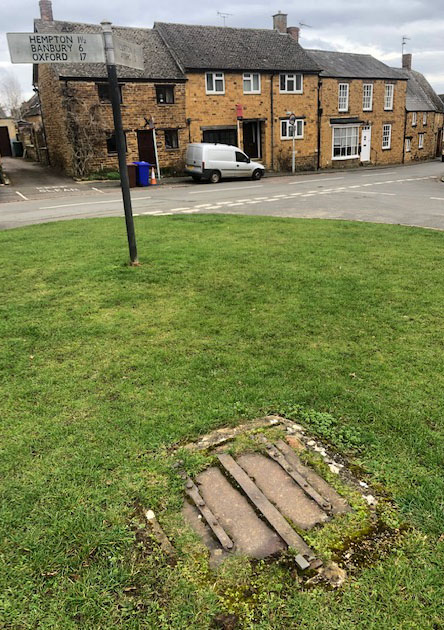 The pump has long gone but a metal cover on the green (click on image) near to the bus shelter now marks the spot. HM Colvin in A History of Deddington (London S.P.C.K. 1963) also refers (p.7) to "...the Town Pool or 'Cook Stoole Pond', whose pollution by offal and other rubbish was a long-standing cause of complaint" and that, after several attempts, it was finally done away with in 1861.
The pump has long gone but a metal cover on the green (click on image) near to the bus shelter now marks the spot. HM Colvin in A History of Deddington (London S.P.C.K. 1963) also refers (p.7) to "...the Town Pool or 'Cook Stoole Pond', whose pollution by offal and other rubbish was a long-standing cause of complaint" and that, after several attempts, it was finally done away with in 1861.
He also notes that, while the practice of sitting the condemned in the cucking-stool had ceased by the 16th Century, another archaic custom of "riding at the quintain, survived long enough to be noted in 1677 but by then it was only 'in request at marriages'." Mary Vane-Turner in her Story of Deddington writes more fully (Ch.8) about the tradition of tilting at the Quintain for weddings.
Dereliction of duty, debts & absence in London
The 25 November 1855 entry in Risley's diary expresses very obvious irritation with Brogden's behaviour: "Whilst the bells were going for Church and I was leaving for Clifton (where he took the service every week) I received a note from Mrs. Brogden asking me to take a funeral for Mr. Brogden at 1/2 past 4 o’clock as he was very unwell. I replied I could not do so - especially after the way in which I had been treated by Mr. Brogden on 3 or 4 previous occasions when asked to take an occasional duty for him of a like kind - as well as of other kinds - and that I hoped he would not apply to me in future for a like purpose, and that as he was able to take the two Duties I conceived him capable of taking the funeral."
A letter to The Times (click on image) written by John Davenport of the Diocesan Registry was quoted in The Oxford Journal on 12 July 1856. It would seem that Brogden had complained to the Bishop about 'oppression' in that his income from the living had been 'sequestrated' to pay for a curate because he was not performing his duties but still living in the Vicarage. Brogden had then appealed to the Bishop and been granted a stipend instead. In his letter Davenport says that Brogden, having been granted a waiver to receive the stipend (against canonical law) had then had to have part of it witheld to pay his creditors. The stipend, he said, "was found to operate as premium to a clergyman who had lost the respect of his parishioners, and whose nominal administration among them had become fatal to their higher interests."
Bishop Wilberforce then wrote to him saying "Your continuance at Deddington is, and my judgement now,
ever must be fatal to the interests of Christ's church and the souls of
your people." Brogden replied that "nothing but preferment should ever
induce him to resign." (HM Colvin p.100)
On 12 September 1856 Risley wrote that: " Mr. & Mrs.Brogden had started for London again by the last train this evening with a quantity of luggage, Mr.B. having previously sent for the keys of the Church and Register Chest from Mr.Spears. (the Clerk)." The entry presaged what was to be an absence of three years.
The diary entry for 23rd September 1856 indicates that Brogden left behind very significant debts: "Called on Hatten of the Kings Arms who had put a Bailiff into the Vicarage House
yesterday on account of a Bill Sale given him by the Vicar on a
considerable portion of his furniture, in part liquidation of a debt due
to Hatten from the Vicar of £175 odd." This is equivalent to some £18,500 in 2020!![]() Inevitably, he was declared bankrupt owing 'upwards of £700' to Deddington tradesmen. Mr Hirons (described as a bookseller) must have been a major unsecured creditor because he was assigned to represent all of them. The Oxford Chronicle's report of the London Debtors Court on 23 January 1858 (click on image) indicates that he had borrowed large sums from a London firm of Solicitors secured by a mortgage on a Life Policy and property. Yet another sequestration was the consequence.
Inevitably, he was declared bankrupt owing 'upwards of £700' to Deddington tradesmen. Mr Hirons (described as a bookseller) must have been a major unsecured creditor because he was assigned to represent all of them. The Oxford Chronicle's report of the London Debtors Court on 23 January 1858 (click on image) indicates that he had borrowed large sums from a London firm of Solicitors secured by a mortgage on a Life Policy and property. Yet another sequestration was the consequence.
Brogden's return
The Banbury Guardian carried an article in 1859 which included a 'Memorial' (Petition) dated 16 April from 128 Deddington parishioners to their Bishop in which they appealed for the Vicar's employment elsewhere. They complain about his frequent absences and burden on the parish due to his several sequestrations to pay his debtors and that "The parishioners began to desert their parish church, until the congregation dwindled down to a very small number, and the communicants fell off to a smaller number than was ever remembered here, being on one occasion only two." But Brogden refused to resign.
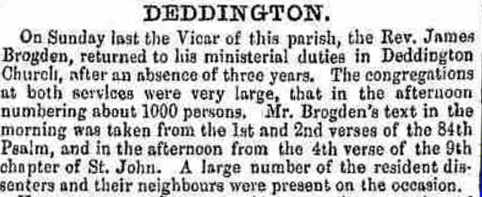
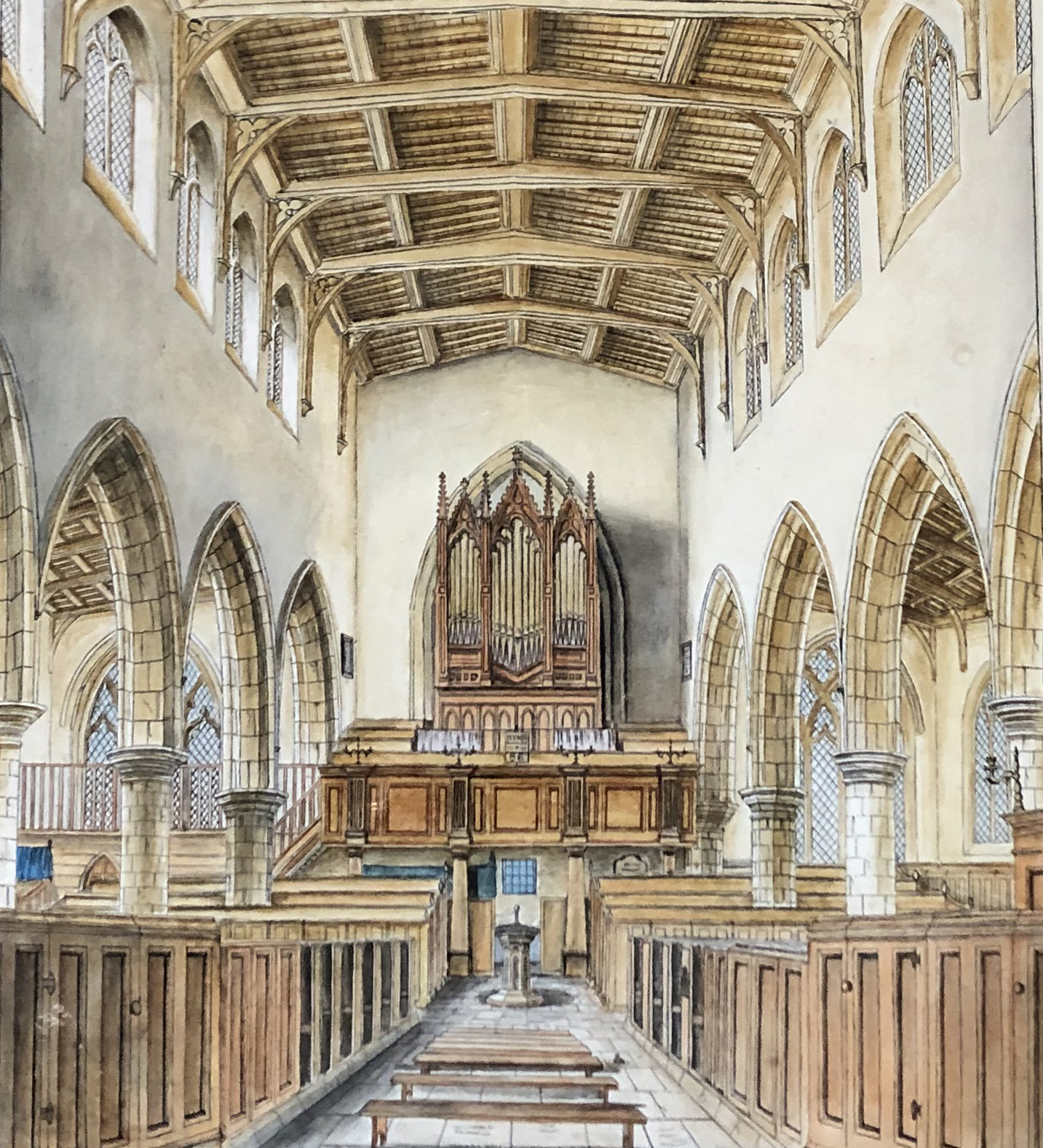
On 15 October 1859 Jackson's Oxford Journal reported that Brogden's return to Deddington had attracted a congregation of 1000 (click on images to zoom). This might seem excessive today but there were extensive galleries at the west end of the church until they were removed in the later 1860s.
Pawning
of the church bell ropes
Ruth Johnson, in one of her Bits & Pieces articles for the Deddington News (2002) recounted "A few years ago I found the following snippet in the magazine This England: ‘According to legend the churchwardens of Deddington once sold their own church bells in order to buy drink’. In the following issue of this publication came the reply: ‘As a former churchwarden of that church, let me give you the true version. It was not the churchwardens who sold the bells but the Vicar, [James Brogden] incumbent from 1848 to 64. He pledged the ropes for drink at the Unicorn Inn, and the bells were not allowed to be rung until the debt was paid. Hence the legend ‘Drunken Deddington3 – where the Vicar pawned the bells."
This story is reinforced by an extract from Chapter 3 of Mary Vane Turner's Story of Deddington in which she talks about the Post Office adjacent to Ilbury House on New Street 4 "...on another of its walls, stripped some years ago for re-papering, boldly scrawled across the plaster was the following record of a regrettable page in the town's past 'This day the bell ropes of Deddington Church pawned for drink'."
3 The reputation of 'Drunken Deddington' dates further back and its origins are more probably based on the large number of ale houses in the 18th & 19th Centuries giving rise to the local parish ditty about 'dirty drunken Deddington'. It may well have been further enhanced by Brogden's drinking habits!
4 This would have been the northern half of what is now the Old Post House which has been rebuilt since Mary V_T's time following a fire in the 1930s.
Charge of Assault
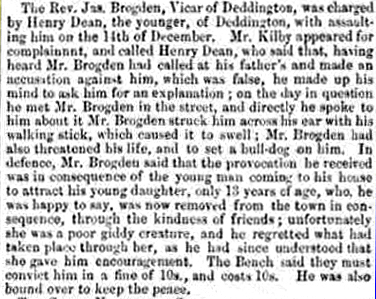
Risley's diaries have no entries for a large part of 1861/62 and so do not include a 14 December 1862 assault on Henry Dean as reported in Jackson's Oxford Journal (Click on image) on 11 January. "Mr. Kilby appeared for the complainant and called Henry Dean who said that, having heard Mr. Brogden had called at his father’s and made an accusation against him, which was false, he made up his mind to ask him for an explanation. On the day in question he met Mr. Brogden in the street, and directly he spoke to him about it, Mr. Brogden struck him across his ear with his walking stick, which caused it to swell; Mr. Brogden had also threatened his life, and to set a bull dog on him." The article (l) includes his defence and the guilty sentence.
He was separately summoned on the same day for "...non payment of poor rates amounting to upwards of £3." He did not bother to attend this hearing.
Editor's note: An undated cutting for 1862 in Coggins' scrap books records a report from the Middlesex Sessions that a W.H. Brogden was sentenced to 2 years' hard labour for larceny. This was Brogden's son, William Henry, who eventually died of consumption in Deddington in 1865.
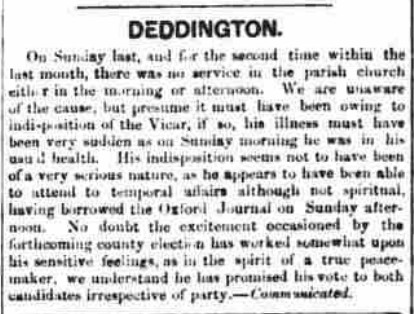
The Banbury Advertiser on 16 January 1862 (click on image) complains about his failure to hold a service 'although he appears to have been able to attend to temporal affairs'.
Death - 13 February1864
Risley's Diaries has these entries:
- 10th February "John Spiers came to announce that Mr Brogden was seized with a fit of apoplexy after morning service and lay in a hopeless and dying state. This sad intelligence was confirmed by a note from Mr Turner, who wrote that he did not think Mr Brogden would live from hour to hour.5
- 11th February – Spiers came and reported Mr Brogden as lying still in an unconscious state. I went to see the Bishop on the subject."
- 13th February – Mr Spiers came again about Mrs Brogden – I walked to the Church Yard and marked out a spot for poor Mr. Brogden’s grave."
- 18th February "I buried poor Mr Brogden, our late Vicar for 16 years, aged 58. It was a trial to me altogether, his wife and family attended the funeral."
HM Colvin writes (p.100): "For five more years Brogden endured what he called
'the tedium of being crossed by the small minds of Deddington' until, on Ash Wednesday 1864, apoplexy caused by intoxication rid the parish at last of this 'worthless and wretched man'."
At the time of compiling this article (January 2021) the location of his grave is not known. It is not recorded in the Oxfordshire Family History Society survey of our churchyard graves and the Parish Registers we have online stop at 1845.
Further sources & references
References to Brogden in local newspapers (1848-64) Each of these transcripts or summaries contains a hyperlink to the corresponding page in the relevant issue of Jackson's Oxford Journal or one of the Banbury newspapers on the British Newspaper Archive website. Free access may be available from some libraries and educational institutions but otherwise a subscription is required.
Newspaper references to Deddington
Mary Vane-Turner's Story of Deddington
Acknowledgements
The newspaper cuttings imaged in this article are courtesy of John Plumbe. The poor readability of some images is entirely due to the original scans in the British Newspaper Archive. However, they are of a high resolution and so can be zoomed larger if that makes them easier to read.
David French's extensive research to index and summarise George Coggins' Scrap Books and compile a list of all newspaper references both for this article and elsewhere has provided a hugely valuable research tool;
